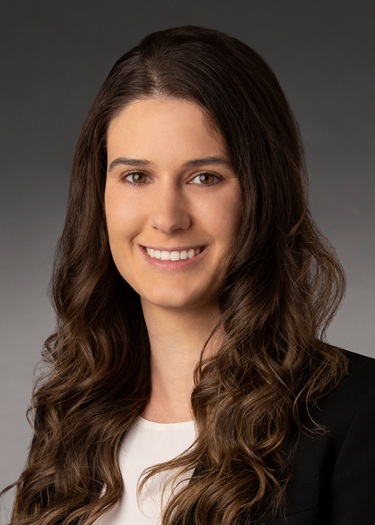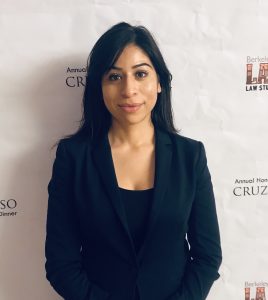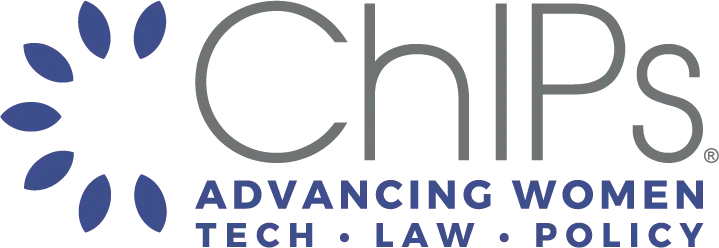In 2018, ChIPs established the Rachel Krevans Scholarship to encourage women to pursue careers in intellectual property law.
We established the scholarship to honor the memory of Rachel Krevans, a renowned intellectual property litigator at Morrison & Foerster LLP, and to promote diversity in IP, a practice area central to ChIPs’ roots. Krevans was a renowned intellectual property litigator at Morrison & Foerster LLP whose career spanned nearly three decades of groundbreaking trials and high-profile patent disputes.
Rachel was repeatedly recognized as a top IP litigator and a leader in tech law. She was passionately dedicated to the advancement, promotion and retention of women in tech and IP fields. Krevans served on the ChIPs Law Firm Advisory board at ChIPs and was inducted into the ChIPs Hall of Fame in 2014.
Each year, we give the award to one qualified female law student entering her third or subsequent year who has demonstrated an interest in IP law and a commitment to ChIPs’ mission of advancing and connecting women in technology, law and policy.
We recently followed up with our previous winners – Laura Ashley Harris (our 2018 scholarship recipient) and Leslie Diaz Moreno (our 2019 scholarship recipient) to see what they’re doing now.
Laura Ashley Harris
Georgetown University Law Center

In 2018, ChIPs awarded our first ever Rachel Krevans Scholarship to Laura Ashley Harris.
Laura was then in her third year at Georgetown University Law Center. She discovered her passion for IP law in addition to cybersecurity and privacy while working as a Summer Associate at Sidley Austin LLP in Washington DC. In her free time, Laura was Laura is Editor-in-Chief of the Georgetown Law Technology Review and had also spent 9 years volunteering with the Society of Women Engineers (SWE) and served as the President of the Cal Poly Collegiate section.
Laura went on to earn her J.D. from Georgetown University Law Center.
Today, Laura is an IP Litigation associate in Sidley’s Washington, D.C. office. Laura has worked on multiple IPRs and actions before the International Trade Commission. Laura’s matters have involved a diverse group of technologies, including mobile communications, immunotherapy and security systems.
We recently caught up with Laura to talk about what she’s working on now.
What impact has the Rachel Krevans Scholarship had on you?
The Rachel Krevans Scholarship has impacted me in at least a few ways. First, it introduced me to an organization of really incredible women who are taking charge of their careers in a variety of ways, and in doing so, I’ve had the opportunity to meet and network with a number of these women. Second, I think recognition from ChIPs has helped me in other endeavors because of the respect the organization commands. Third, it has given me the opportunity to share my experience with others and provide mentorship for those looking to apply for this scholarship or just learn more about the organization.
What has been the most challenging aspect of transitioning from full-time law student to full-time lawyer? What has surprised you?
The most challenging aspect is probably not having as much control over my own schedule. Both school and work consume a lot of time, but as a student, you can complete your assignment on any schedule you want. As a full-time lawyer, you more or less need to work on a more structured schedule in order for your colleagues to get ahold of you. I think what has most surprised me is the amount of responsibility I’ve been given as a first year. It hasn’t been all doc review.
For our student members: What’s a typical day in the life of a first year law firm associate?
Honestly, it depends, particularly on the stage and type of case you’re working on. I’ve been fortunate during my short time at Sidley to have worked on an ITC case, IPRs, and district court cases. However, typically when I get in to the office in the morning, I check and respond to emails I may have received overnight. Then, I usually have a prioritized list of tasks on a wall in my office and work on the highest priority item (which may change day to day).
Typically I’m staffed on 2-4 cases at a time, if I include pro bono cases, so it is a matter of keeping everything moving on a reasonable time frame. The reason I say it depends is because some days, I spend doing legal research, some doc review, some I’m writing or responding to motions or petitions, and some days I’m writing or responding to discovery requests.
The variety of legal work almost makes it impossible to have a typical day, but the variety is what keeps it interesting. The key is keeping organized and having clear expectations by communicating with partners and senior associates about when different tasks need to be completed. (My typical day, however, does always include a short coffee break in the afternoon with some of my fellow associates, which gives us a nice time to get out of the office and step away from our desks.)
You’ve represented tenants before the D.C. Superior Court in multiple eviction and nonpayment of rent cases. What drives you to do pro bono work, and what would you say to others who are looking to give back?
Giving back was a priority for me, even in choosing to go to law school. For those looking to give back, I’d recommend choosing a law firm that provides some incentives, in terms of hours, for completing pro bono work. For example, my firm will count up to 200 hours of pro bono work towards my billable hours. Essentially, this gives you the space to do pro bono work throughout the year. I’d also recommend selecting the type of pro bono cases based on your availability and client demands. For example, if you know you are going to have a very busy month, pick a pro bono project that doesn’t have strict court deadlines during that period to give yourself the flexibility to work on the pro bono matter when you have time.
Tell us an unexpected or fun fact about yourself.
I have a minor in Wine and Viticulture, and I’ve made my own wine.
Leslie Diaz Moreno
of California, Berkeley, School of Law

When Leslie Diaz Moreno was awarded our 2019 Rachel Krevans Scholarship, she was entering her third year of law school The University of California, Berkeley, School of Law. We asked her a few questions to learn more about what she’s doing now.
What are your plans for after you receive your JD?
I plan on working in the intellectual property team of Kirkland & Ellis LLP in the San Francisco office.
You co-founded the Women in Technology Law Mentorship Program at Berkeley Law. Tell us about this program and how it is helping women in law at Berkeley.
The WiTL Mentorship Program supports WiTL’s larger mission to recruit, support, and empower women in technology law. The program offers women attorneys working in technology law and women J.D. students interested in technology law the opportunity to develop meaningful professional relationships. Through these relationships, the program aims to create spaces where the attorneys and Berkeley Law students can discuss the opportunities, challenges, and successes that women encounter in the tech law field. Mentors and mentees are encouraged both to take advantage of the program’s organized events and to shape each relationship to best suit the needs and availability of the mentor and mentee. The program seeks to help WiTL students learn from women who are further along in their careers and to provide practicing attorneys with the opportunity to promote diversity in technology law by inspiring and advising future women lawyers.
What advice would you give to women law students who are seeking out a mentor?
Join Women in Tech Law while in law school! Additionally, engage in networking opportunities, actively participate in meeting new people, and be yourself.
What do you believe to be the most important thing women law students can do to support each other?
Help each other network.
Tell us an unexpected or fun fact about yourself.
Fun fact: I swam in a volcano in Costa Rica 🙂
We’re proud of Laura and Leslie and excited to announce our latest scholarship recipient later this spring. Stay tuned for details.
